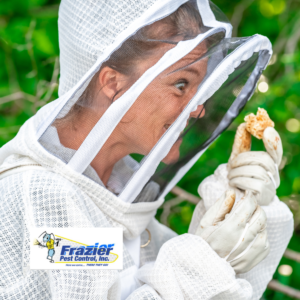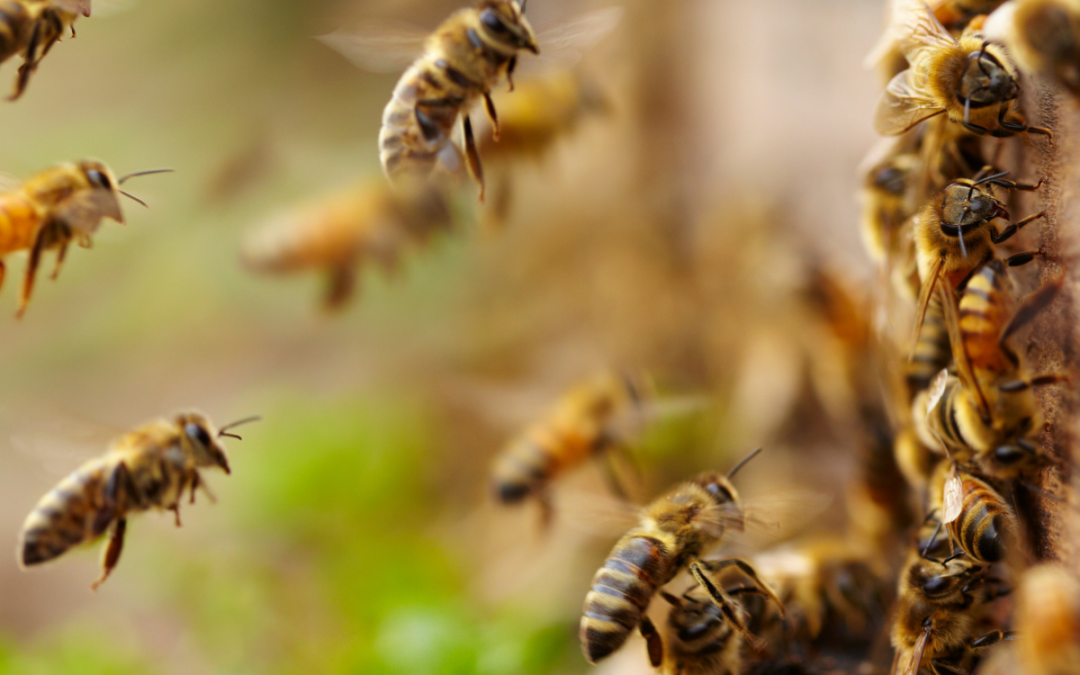Nothing ruins a backyard barbecue or a peaceful evening in your garden quite like the buzz of bees. While bees play an essential role in pollination and maintaining ecological balance, they can also pose a significant threat to your comfort and safety. Whether you’re allergic to their stings or simply want to enjoy your outdoor space without the risk, creating a bee-free yard is possible with the right strategies. In this guide, we’ll show you how to protect your home from unwanted bees while respecting their important role in the environment.
Read more: Bird Removal Solutions: Protect Your Coachella Home

Why Do Bees Visit Your Yard?
Before diving into how to keep bees away, it’s essential to understand why they’re attracted to your yard in the first place. Bees are natural pollinators drawn to the sweet nectar found in flowers. Your garden may have several plants that serve as their buffet. Additionally, bees are attracted to water sources like bird baths, leaky faucets, or even moist patches in the soil. Lastly, sheltered areas such as eaves, tree hollows, or sheds can offer bees a perfect spot to build their nests.
Read more: Carpenter Ants: Eliminating Infestations in Coachella Valley Homes
Key Bee Attractions:
- Flowering Plants: Colorful and fragrant flowers attract bees searching for nectar.
- Water Sources: Puddles, fountains, and leaky sprinklers can lure bees for hydration.
- Nesting Sites: Cracks in walls, tree cavities, and sheltered spots are prime real estate for bees looking to set up a colony.
Read more: Professional Rat Removal Services in Coachella Valley
How to Make Your Yard Less Attractive to Bees
While it’s nearly impossible to keep your yard completely bee-free without harming them, you can take steps to make your space less attractive to them. Here’s how:
1. Plant Bee-Repellent Plants
Bees love some plants but dislike others. Incorporating bee-repellent plants into your garden can help deter bees from buzzing around your space. Lavender, eucalyptus, wormwood, and citronella are some examples of plants that repel bees while adding fragrance and beauty to your garden.
Read more: Flea Control in Coachella Valley: Expert Solutions
2. Limit Flowering Plants
While having a flower-rich garden is appealing, it also invites bees. Opt for plants with less appeal to bees, such as ferns, cacti, or succulents. Additionally, avoid bright-colored flowers or use them sparingly in areas where you spend the most time.
3. Eliminate Standing Water
As mentioned earlier, bees are drawn to water sources. Be diligent in eliminating any standing water in your yard, repairing leaky faucets or sprinklers, and regularly cleaning bird baths. This reduces the likelihood of bees seeking your yard for hydration.
Read more: Argentine Ants in the Coachella Valley: The Unstoppable Invasion
4. Seal Cracks and Holes
Inspect your home and yard for potential nesting spots. Seal any cracks in walls, under the eaves, or in other sheltered areas. Be sure to repair any holes in fencing or siding, as these can be attractive nesting sites for bees looking to start a colony.
5. Use Natural Bee Deterrents
You can try several natural repellents that will discourage bees without harming them. Essential oils like peppermint, cinnamon, and clove can be mixed with water and sprayed around your yard or on plants. Just be sure not to spray directly on flowers that may be beneficial for the local ecosystem.
Read more: Why Squishing Ants Can Make Your Infestation Worse

When to Call a Professional
While the above tips can help reduce the presence of bees in your yard, there are instances when professional help is required. If you notice a large number of bees swarming or suspect there may be a hive near or on your property, it’s time to call in a pest control expert. Handling bees on your own can be dangerous, especially if you’re allergic or unsure of the type of bees present.
Read more: What Should I Do If I Find a Black Widow Spider
Why Call Frazier Pest Control?
At Frazier Pest Control, we specialize in humane bee removal and long-term prevention. Our team will carefully assess your yard, identify the source of the problem, and offer solutions tailored to your needs. With over 20 years of experience, we know how to safely and effectively eliminate bee colonies without causing harm to the environment.
Read more: Cockroach Infestation Solutions for Coachella Valley
Bee Myths Debunked
There are several common misconceptions about bees that often lead to unnecessary fear or incorrect removal methods. Let’s set the record straight on a few myths:
1. Myth: All Bees Sting
Not all bees are aggressive. Honeybees and bumblebees are generally docile unless provoked. Male bees don’t sting at all, and only female worker bees sting to protect their hive.
Read more: Effective Solutions for Termite Infestations in Coachella Valley
2. Myth: Bees Are Bad for the Garden
While bees can be an inconvenience, they are crucial for pollination. Without bees, many plants wouldn’t be able to reproduce, leading to less fruit and fewer flowers.
3. Myth: All Bee Species Are the Same
There are many types of bees, from honeybees to carpenter bees. Understanding the difference between bee species is crucial when deciding how to handle a bee problem. For example, carpenter bees can cause damage to wooden structures, while honeybees are beneficial and should be relocated, not exterminated.
Read more: How Frazier Pest Control Innovates with Sustainable Solutions
Frequently Asked Questions (FAQ)
Q: How do I know if I have a bee infestation?
A: Common signs include seeing bees entering or exiting a specific area frequently, a noticeable hive or nest, or a constant buzzing sound in one part of your yard. If you’re unsure, it’s best to call a pest control professional for an inspection.
Q: Can I remove a bee nest on my own?
A: It’s not recommended to handle a bee nest yourself, especially if it’s large or if you’re allergic to bee stings. Bees can become aggressive if they feel threatened, and disturbing a hive can lead to multiple stings. Always contact a professional for safe removal.
Q: What should I do if I get stung?
A: If stung, carefully remove the stinger by scraping it out with a flat object (avoid pinching, as this can release more venom), clean the area, and apply ice to reduce swelling. Seek medical help immediately if you’re allergic or experience symptoms such as difficulty breathing.
Q: How can I prevent bees from returning after removal?
A: After professional removal, Frazier Pest Control will advise on preventative measures such as sealing potential nesting areas and reducing attractive food and water sources in your yard.
Q: Will Frazier Pest Control kill the bees?
A: We prioritize humane removal methods whenever possible. Our goal is to relocate bees to a safer area where they can continue to play their critical role in the ecosystem.
Enjoy a Sting-Free Yard
While bees are essential to our environment, you shouldn’t have to sacrifice your comfort or safety to accommodate them. By following these tips and seeking professional help when needed, you can enjoy a peaceful, sting-free yard. Frazier Pest Control is here to help you balance your love for nature with a safe, bee-free home.
If you’re facing a bee problem in your yard or suspect a hive nearby, don’t wait—call Frazier Pest Control today at (760) 328-6115 or visit us online at frazierpestcontrol.com. Let us handle your bee issues so you can get back to enjoying your outdoor space worry-free!
“Here we come…There they go!”


Recent Comments